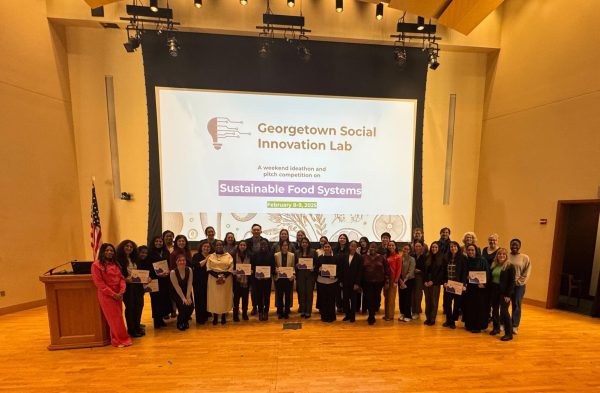A social impact-focused venture pitch competition awarded three student teams cash prizes for projects supporting sustainable food systems Feb. 8 and 9.
Twenty-six students across eight randomly assigned teams participated in the Global Social Innovation Lab (GSIL), hosted by the global human development program in the School of Foreign Service in partnership with the Georgetown University Graduate Student Government and Georgetown Entrepreneurship, a program focusing on experiential business training. Participants, with their teammates and mentors, developed and refined pitches that tackled how to solve global food insecurity over one day before presenting their plan to a panel of judges.
Cropshare, a program that would work to make equipment and transportation accessible to independent farmers in India, won first place. Team members Molly Knapp (GRD ’26), Lily Nguyen (GRD ’26) and Shivani Aggarwal (LAW ’25) pitched Cropshare and received $1,500 total.

Nguyen said the randomized team-making process encouraged more innovative projects since participants drew from their different perspectives and backgrounds.
“It was our first time meeting each other, all from different programs and different backgrounds, all using our different backgrounds to look at what different talents we had and what we could bring to the table,” Nguyen told The Hoya. “And from there, we came up with an idea, and we just ran with it.”
Gina Hall, an adjunct lecturer who mentored Cropshare during the competition, said the opportunity to work with strangers provided experience for participants as they enter the workforce.
“I think the more real-world experiences, the sooner, the better for students in, kind of, being ready to jump into their first job,” Hall told The Hoya.
Aggarwal said that by starting small and focusing on feasible goals, even a limited investment in agricultural inputs can create dramatic change.
“The way that we would be able to support these farmers with higher prices is by cutting out the middleman and providing transport so that those smaller farmers are actually able to bring their produce to local markets, but then also to larger food producers,” Aggarwal told The Hoya. “We would be able to support consistent product quality, taste and nutrition by providing inputs such as seed fertilizer to these farmers.”
Victoria Guillemot (GRD ’25), Michael Liu (MSB ’25) and Shriya Matta (GRD ’26) received $1,000 for BioConnect, an app that would connect small farms and bio companies to turn food waste into fertilizer. Olayinka Adedeji (GRD ’26), Monica Khanal (GRD ’25) and Chandrika Khera (GRD ’27) won $500 for Foodsaved, an app suggesting recipes for expiring food to prevent waste.
Ekin Birol, director of the graduate certificate in social innovation and global development and co-founder of GSIL, said the competition encourages students to engage with socially innovative ideas.
“I want them to understand the issue at hand but also not lose hope, but think that there are solutions out there too and that they themselves can come up with these solutions,” Birol told The Hoya. “I want them to be realistic, know the problems, but also be hopeful, creative and think outside the box.”
Knapp said she enrolled in the SFS graduate program because of its hands-on opportunities, such as GSIL.
“One of the reasons I came to grad school was to build some of those harder skills that I could use in the international development space,” Knapp told the Hoya. “So something like being able to know how to pitch, come up with innovations to increase private public partnership — I thought this would be a great low stakes way to practice that.”
Julian Lampietti, an adjunct SFS professor and sustainable agriculture expert at the World Bank who served as another mentor for the event, said he feels learning from students’ ideas is essential to proposing innovative solutions to global problems.
“If we’re going to bend the arc of the food system, from destroying the planet to saving the planet, what better place to start than the future of the planet,” Lampietti told The Hoya.
Nguyen said that despite having no past experience in global development work, the experience was transformative.
“If anybody is curious about this event program, I definitely encourage them to apply next year, even if they have no background at all, because I didn’t have a background,” Nguyen said. “This is just incredible.”
Aggarwal said a desire to expand access to resources inspired her to get involved with GSIL.
“I’ve worked with some of the startups before, and I’ve always been passionate about technology and how it could solve the problem, and I believe that technology could bring more access to people,” Aggarwal said. “So I’ve always wanted to be a part of some innovation. So that’s what motivated me.”